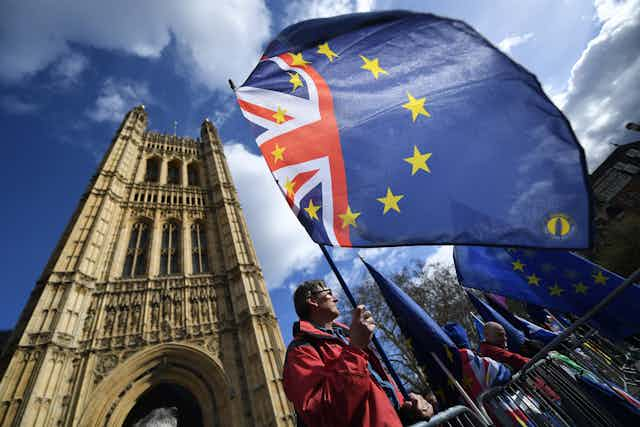During another tumultuous week in British parliamentary history, attention turned to whether a country can decide to unilaterally withdraw from an international treaty – and if so, whether this could apply to the Brexit deal.
This question is now at the centre of the government’s efforts to persuade MPs to vote in favour of Theresa May’s Brexit plan when it is put before parliament again. It has been raised in relation to the so-called Irish backstop, a mechanism in the Brexit withdrawal agreement designed to avoid border checks on the island of Ireland. Some MPs want assurances that the UK could just rescind the withdrawal agreement in the event that the backstop became operational and locked the UK into an unwanted, perpetual customs union with the EU.
New advice from the attorney general, Geoffrey Cox, circulated to Conservative MPs on March 14, advised that Britain could leave the Irish backstop under international law if it had a “socially destabilising effect on Northern Ireland”.
But while there are provisions under international law that could allow the UK to withdraw, little is being said about the consequences of such a decision. Particularly for a country looking to sign a raft of international trade agreements with the rest of the world immediately upon regaining the freedom to do so.
Read more: Brexit: why is the Irish border 'backstop' so crucial to securing a Brexit deal?
So far, the UK has chosen to follow the process for leaving the EU set out in the Lisbon Treaty through its now famous Article 50. But parliament could still change its mind now, or at a later date, about how to leave, or whether to do so. The immediate question is whether parliament can ratify the prime minister’s deal and then after it becomes binding between the UK and the EU, rescind it?
There are two issues to consider here. The first is whether the UK could use the mechanisms of international law to abandon the agreement, and the second is whether it could step away unilaterally, as an exercise of national sovereignty if the agreement no longer serves the national interest.
There is no mechanism in the withdrawal agreement to rescind the backstop. But negotiated withdrawals are, however, always possible under international law. For example, in 1868 the US Supreme Court ruled that that while the US Constitution prohibits unilateral secession – and by implication expulsion – of any of the 50 US state, one or more states may be allowed to leave the union with the consent of their peers.
Vienna Convention
So long as the consent of the other party can be obtained, a country can withdraw from any international agreement. This is supported by article 54 of the Vienna Convention on the Law of Treaties 1969, which states that the termination of a treaty or the withdrawal of a party may take place (a) in conformity with the provisions of the treaty; or (b) at any time by consent of all the parties after consultation with the other contracting states.
But even if it can’t obtain such consent from the EU to abandon the withdrawal treaty, the UK remains ultimately sovereign. And crucially, supremacy of EU law or of any other international instrument over domestic law does not stem from any international treaties, but from the will of the British parliament.

From this point of view, it really is of no consequence whether the UK has a legal right to withdrawal from the Irish backstop. Article 62 of the Vienna Convention, which allows withdrawal from an international treaty for fundamental change of circumstances, wouldn’t need to be used either.
A country contemplating withdrawing from an international treaty, without meeting the criteria to do so, is not likely to be deterred by the Vienna Convention. Nor would there be an effective enforcement mechanism to compel a country not to withdraw from a treaty, unlike in actions in investment tribunals brought about by private parties which have tangible financial consequences.
The consequences
Constraints on unilateral withdrawal from the backstop (or the withdrawal treaty in its entirety) are not legal, but political – and those parliamentarians who suggest it would be possible to accept the agreement and then pull out are correct. But there will be consequences, often overlooked by those poring over the legal fine print.
An example from personal finance is useful here. If you stop paying your credit card bill, this may have legal consequences you can live with. Perhaps a bank or a debt collection agency would be willing to settle with you rather than assume the costs of going to court. Even if you’re not worried about the legal consequences, however, damaging your credit score will impact your future business or ability to get another loan.
A similar fate awaits a nation that develops a reputation for ignoring its international obligations. “Computer says no” is a frustrating response to anyone applying for a new credit card. It will be a lot worse when trying to replicate a score of international trade deals after Brexit.

